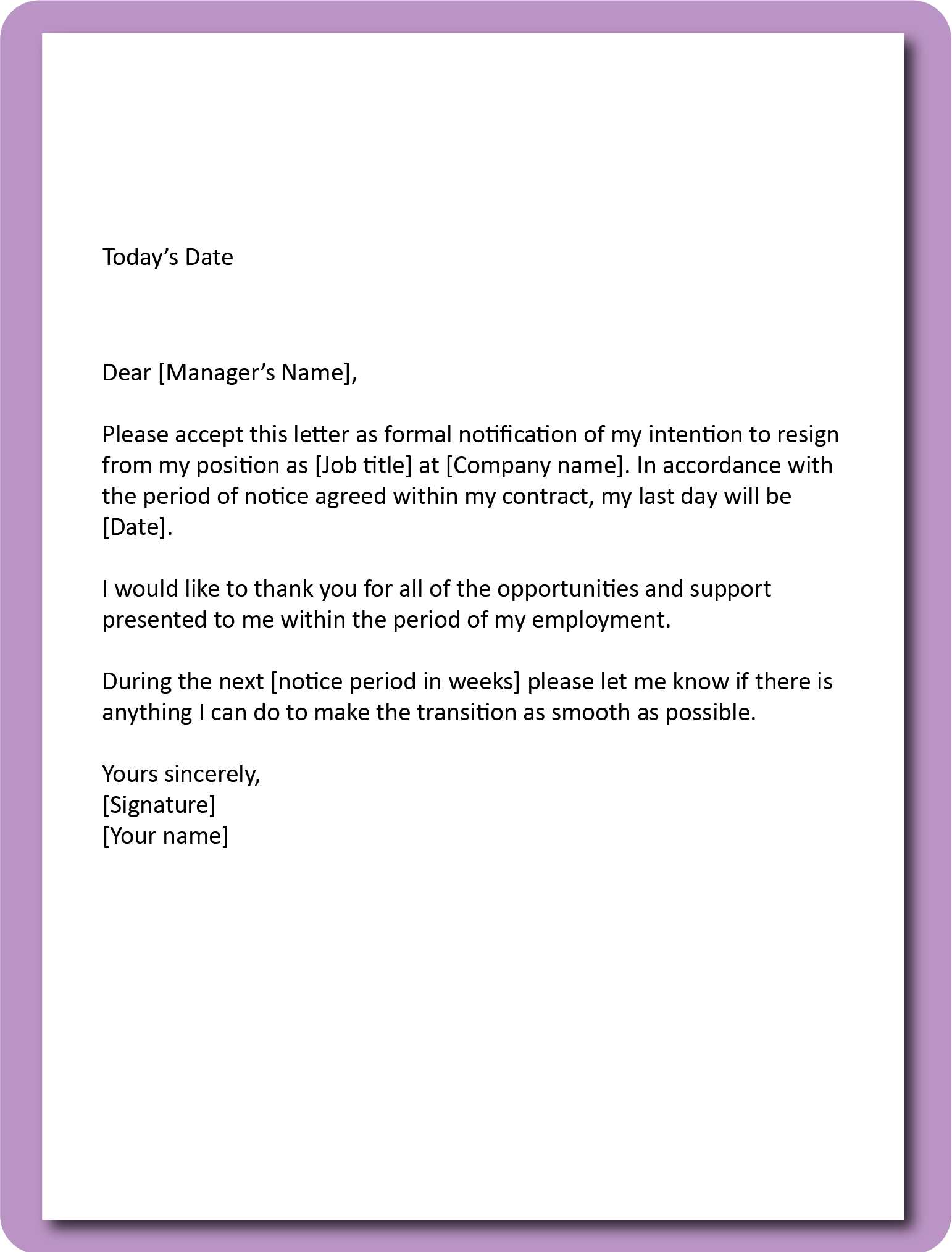
The Resignation Revolution: Saying Goodbye with Grace
15 Feb, 20241-2 minutes
In this blog, you will learn:
- What a resignation letter is.
- Why a resignation letter is needed.
- What to include in your resignation letter.
- When to hand in your resignation letter.
- What to do after resigning from your job.
The time has come for you to take your next career step, so it's time to write your resignation letter.
When the time comes to leave your job, it can be tricky to put into words why you wish to leave your current position.
Whether you're leaving due to personal reasons, a new job offer or because your current position is unable to offer you any career progression, it's essential that you write a professional resignation letter.
Submitting your resignation letter can feel daunting. According to Statista, in the second quarter of 2023 approximately 335,000 resignations took place in the UK, so it’s important to know that you're not alone and to not let the fear stop you from resigning.
What is a resignation letter?
A resignation letter is a formal document that you submit to your employer, notifying them that you intend to ‘hand in your notice’ and leave their business.
A resignation letter can be a printed letter or an email and should be written in a professional manner, stating when your last day of employment will be. Resignation letters are important to help ensure you have a smooth transition whilst maintaining a positive professional relationship with your employer.
Resignation letters do not need to be long and they only need to contain basic information. You don’t need to include any negativity about the business, irrelevant personal details or comments about other employees. If you have grievances with your employer, these can be addressed in your exit interview.
Why is a resignation letter needed?
When leaving a role, a resignation letter is required as it serves as a formal and written notice of your intention to leave a company. It provides clarity and avoids any confusion about your departure.
Submitting a resignation letter is a professional way to leave your job. It reflects positively on you and can help maintain a good relationship with your employer, colleagues, and the company itself.
Some companies have policies that require employees to submit a formal resignation letter. Even if it's not mandatory at your workplace, it's a good idea to check the company's policies and adhere to any specific requirements.
Other reasons why a resignation letter is needed:
- To serve as a formal notification.
- To act as a documentation of terms.
- To maintain professional relationships.
- To provide a sense of closure.
To serve as a formal notification
A resignation letter serves as a formal and official way to notify your employer of your decision to leave the company. It establishes a clear and documented record of your intention to resign.
To act as a documentation of terms
A resignation letter outlines important details such as your last working day and any agreed-upon notice period. Having these details in writing helps prevent any misunderstandings and provides a reference point for both you and your employer.
To maintain professional relationships
Leaving a job is a significant life transition, and maintaining positive professional relationships are important. Submitting a resignation letter demonstrates professionalism and courtesy. It reflects positively on your character and shows your respect for the company and its procedures.
A well written resignation letter can also help retain a positive relationship with your employer and colleagues and can serve as a bridge for potential future opportunities or references.
To provide a sense of closure
Writing a resignation letter provides a sense of closure for both you and your employer.
It allows you to express gratitude for the opportunities you’ve had, and to leave on a positive note.
What should I include in my resignation letter?
Many resignation letters typically include your name, date, addressee, when this is effective from, the reason for leaving, gratitude for the opportunity, your last day of employment and your signature.
When should I hand in my resignation letter?
You should inform your manager about your resignation straight away. Your manager won't be too impressed if they are the last to know and it may burn some bridges for future opportunities.
Your manager might want to discuss your reasons for leaving so make sure you are well prepared for this conversation. However, if you don't want to share your reasons for leaving, you don't have to.
There is a chance that your manager will come back to you with a counter-offer. According to recruitment software provider Eclipse Software, 50% of candidates that resign will be counter offered by their current employer. If this is the case, you should really consider your options and don’t make any decisions right away.
You need to look at more than just the salary and benefits and consider which company will help you develop your career in the long term.
Example of how to write a resignation letter
It’s beneficial to thank your employer for the opportunity as it can leave a positive impression and maintain a good relationship for potential future references. You should refer back to your contract to find out what notice period you are required to work and see if there are any unused holidays you are eligible for.
You should also follow a clear and concise format so there is no confusion and to ensure your letter is straight to the point.
Here is an example of a standard resignation letter:

Who is Spencer Clarke Group?
Since 2017, we've been changing the face of recruitment. We continue to use our expertise and experience to effect meaningful change and have a positive impact on everyone we encounter, whether it be our employees, candidates working for our agency or local authorities.
If you’re struggling to fill a role, why not give us a call on 01772 954200 to see how we can help? One of our consultants will be happy to listen to provide the best possible advice for you.
If you’re searching for a new role, why don’t you visit our job page or upload your CV and take a look at the latest opportunities?
We operate in two sectors:
In eleven specialisms:
Healthcare, Social Care & Nursing
Corporate Functions & Business Support


